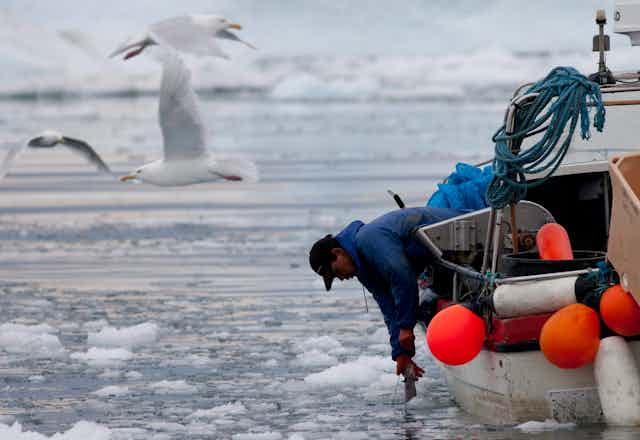For more than 20 years, a movement has been building that recognizes the vital role that small-scale farmers, fishers and harvesters, women, traditional knowledge and appropriate technologies will play in transforming our unsustainable and inequitable food system.
While the chemical- and carbon-intensive practices of industrial agriculture play a role in feeding people across the globe, they are a major contributor to the degradation of land, water and ecosystems, climate change, labour inequality and the diminishing health of the Earth and its population.
Agribusiness corporations that increasingly control food and seeds are getting bigger and more powerful, while the small-scale farmers that produce 70 per cent of the world’s food are increasingly impoverished.
These were the concerns on the minds of more than 150 people who gathered in Ottawa in late August for the Canadian Agroecology Field School and Research Summit hosted by the FLEdGE research network, Just Food, USC Canada and a number of other partners.
Participants included small-scale family farmers, civil society organizations, researchers and Indigenous leaders who came together to share knowledge and experiences, and to map out a direction for healthier, more equitable and sustainable food systems in Canada and beyond.
Read more: Why developing countries should boost the ways of small-scale farming
From the three days of farm visits, demonstrations and discussions, it was clear that listening carefully to researchers and practitioners involved with agroecology offers promise and possibility for feeding global populations with a mix of science and time-tested knowledge.
Easy, cheap to implement
Evidence from around the world shows these opportunities can be implemented fairly easily and at a low cost.
While the term agroecology has no fixed definition, it is best described as a science, practice and movement. As a movement, agroecology is a call to action for a food system driven by the world’s food providers — small-scale farmers, fishers, livestock keepers, Indigenous peoples and other movements like the global peasant movement La Via Campesina, whose members include 200 million small-scale food producers and harvesters from around the world.
As a science, agroecology encompasses knowledge that uses time-tested scientific principles, natural processes and materials to replace synthetic fertilizers and herbicides that destroy our soils, waters, biodiversity and pollinators.
Through farmer-led research and innovation, agroecology aims for resilient, biodiverse ecosystems. As a practice, agroecology has been developed through experience and field observation by farmers, Indigenous peoples and food providers, and spread out around the world. Farmer-to-farmer learning and knowledge sharing are at the heart of agroecology.
Local seeds
Over the first two days of the Agroecology Summit on farms in Ottawa and Gatineau, the group observed and discussed many agroecological practices.
They included rotational livestock grazing, farmer-led participatory research and breeding of vegetables, the selection of hardy, locally adapted seed varieties, agroforestry, the practice of adding value to crops through on-farm processing, establishing cooperatives to lease otherwise unaffordable farmland and selling food directly to consumers.
On the third day, a keynote presentation from Peter Rosset, a researcher from the Center of Studies for Rural Change in Oaxaca, Mexico, on the evolution of agroecology through La Via Campasina kicked off two keynote panels. The first focused on Indigenous perspectives on agroecology, and the second on the future of agroecology in Canada. Both included researchers, farmers and Indigenous leaders from across the country.
From the three days of farm tours, demonstrations and discussions, one thing was clear: Agroecology is a growing movement around the world.
Fuelled by a rising public appetite for more ecologically and socially sustainable approaches to food production and the push to do things differently, agroecology offers practical solutions for a new generation of farmers who can learn from more experienced growers while connecting to a global social movement.
Building a different food system
With the rejection of an outmoded and unfair model of agriculture, the Agroecology Summit highlighted a mission that’s about more than just changing our agricultural methods. It’s also about being part of a global movement that is actively building a food system based on a different set of values — working with nature, valuing food producers and the spiritual nature of food.
The benefits of agroecology are already being appreciated in other places.
For example, those benefits meet most of the United Nation’s Sustainable Development Goals: Reduced hunger and poverty, enhanced biodiversity, sustainable livelihoods, the empowerment of women and youth and climate resilience. The combination of innovation, scalable practices and system-wide benefits has attracted governments, international organizations and donor agencies alike.

France, the champion of climate-friendly agriculture and host to the 2015 Paris Climate Summit, has shown leadership that can inspire other countries. For example, France has a Minister for Ecological Transition, something sure to be on the agenda as the French take over from the Canadians as the next G7 president.
The Agroecology Fund, a U.S.-based philanthropic foundation, provides funding to civil society organizations for agroecology. What’s more, the Food and Agriculture Organization (FAO) has become a leading proponent of agroecology. At the International Agroecology Symposium in April 2018, FAO Director General José Graziano da Silva called for a transformation in the way we produce and consume food, and towards a new future of agriculture.
Women’s rights
Canada’s new Feminist International Assistance Policy has taken a cue from the international agroecology movement that puts women’s rights and smallholder farmers’ rights at the centre of development strategies.
A strategic investment in agroecology is a highly effective way to advance Canada’s objectives of women’s empowerment, environment and climate action, human dignity and economic growth that works for everyone.
The challenge ahead for the Canadian government, and society as a whole, is to actively support this groundswell of research, energy and innovation through funding and policy support, and to move faster towards more equitable and sustainable food futures. The transition to agroecology will make for a harvest that is both bountiful and sweet.
Faris Ahmed, Policy Director at USC Canada and member of the FLEdGE network, is the coauthor of this piece.

